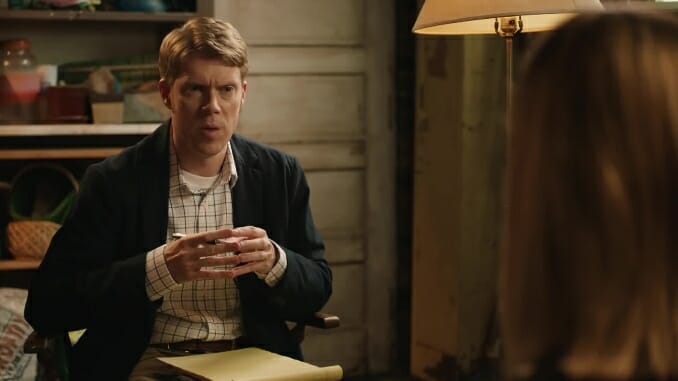Seeso Hidden Gem Shrink Delicately Blended Absurdist Humor and Mental Health Awareness
Image courtesy of Seeso/NBC
In the fall of 2018, I found myself newly divorced and living alone for the first time in my life. While the break-up was ultimately a positive decision, I signed over my half of the house and had to leave my precious dogs behind. My nights were quiet and my anxiety was high, so I spent evenings catching up on comedy shows. Along with improv comedy podcasts, they were what helped me laugh through the pain of failure and loneliness. They kept me sane during a time when my mental health was in flux.
Seeso, NBC’s comedy-focused streaming platform, had recently folded, yet many of its original shows found homes on other services like Hulu and VRV. I laughed until my sides hurt at Jonah Ray’s brilliant parody of travel shows, Hidden America, the television version of the podcast My Brother My Brother and Me, and Kulap Vilaysack’s send-up of real estate shows, Bajillion Dollar Propertie$, that starred the incomparable Paul F. Tompkins.
But there was a show that I connected with on a deeper level than all the rest. Shrink was co-created by and starred actor and improvisor Tim Baltz. Shrink takes an honest and comedic look at ethics in therapy from both sides. It shows the dangers of when a therapist might cross ethical lines to help out their patients, and the battles those patients have to fight for themselves.
Baltz currently stars on HBO’s hit show The Righteous Gemstones as BJ Barnes, Judy Gemstone’s hilariously awkward husband that wants nothing more than to be accepted into a family that constantly rejects him. He’s also a frequent guest on the Comedy Bang! Bang! podcast.
Baltz grew up in Joliet, Illinois, and brings an honest Midwestern sensibility to his characters that is not often seen in comedy. The prototypical Midwesterner has a sense of friendly optimism and integrity not found in other parts of the country. (Though outside of the bigger cities there can also be frightening amounts of conservatism, but that isn’t something that Baltz ever bases his characters on.) As a native to St. Louis, Missouri, I’ve always felt a kinship to the loveable, yet complex weirdos that spawn from Baltz’s mind.
In Shrink, Baltz plays David Tracey, a recent medical school graduate now half a million dollars in debt. After losing his medical residency due to nepotism, David finds himself back living with his mom (Meagen Fay, seen in Malcolm in the Middle, La La Land, and more), stepdad (Joel Murray of Mad Men and Bill Murray’s brother fame), and obnoxious stepbrother, Barry (Kyle S. More). In an attempt to defer his student loan payments, David learns that if he completes 1,920 hours of free therapy sessions under the watch of a clinical therapist, he can become a professional counselor. David is often awkward and repeatedly puts his foot in his mouth, but his heart is in the right place as he sits down to help patients in his parents’ garage.
Shrink handles overwhelming problems—including eating disorders, phobias, and anxiety—in a comedic way that is also respectful of the subject of mental health. Between the laughter and the heartbreak, Shrink features some truly brilliant montages of reflection for Baltz’s character that show his emotional progression throughout the show. It’s a rare comedy that is emotionally complex and masterfully layers absurdist humor within sensitive subjects.
-

-

-

-

-

-

-

-

-

-

-

-

-

-

-

-

-

-

-

-

-

-

-

-

-

-

-

-

-

-

-

-

-

-

-

-

-

-

-

-








































